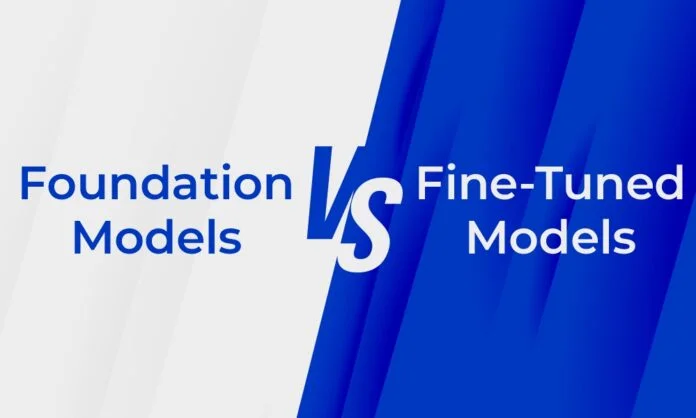AI implementation has gone beyond being just a trend; it has become a necessity for companies. However, firms across the world often get confused about which AI model or large language model to use. Common confusion arises between foundation models vs fine-tuned models. So, how do you choose the appropriate model to drive business success?
The recent decades have observed an increased adoption of AI models across businesses, though LLMs have been around us for decades. Experts found that over 78% of companies worldwide have adopted AI for at least one of their functions. We will definitely observe a higher implementation rate in the coming years. But how will the approach differ with the adoption of foundation and fine-tuned models? And which model will sustain higher business growth?
In this blog, we’ll differentiate between foundation models vs fine-tuned models and find out which one can drive faster business success. Let’s get started…
What are Foundation Models?
Foundation models serve as the base for fine-tuned models. Both large language models and small language models can be foundation models. Such models are versatile; hence, they can execute diverse tasks. These also include several learnable frameworks, which enable them to perform tasks beyond their training data.
Businesses can adopt foundation models and adapt them to fulfil various needs, such as market analysis, automated customer interactions, financial forecasting, and more. Nevertheless, highly targeted information can limit foundation models’ effectiveness when executing specific tasks.
The quality of training data strongly determines the performance of foundation models. If the data is of higher quality, these models can perform better. At the same time, lower-quality data may affect their performance. One of the primary examples of foundation models is OpenAI’s GPT-3, launched in 2020. It includes 175 billion parameters and 499 billion tokens of training data.
What are Fine-Tuned Models?
Fine-tuned models are upgraded versions of foundation models that are trained on specific datasets to perform specific tasks. Unlike foundation models, fine-tuned models cannot execute diverse tasks. They can only perform tasks that they are trained for. Businesses can adopt a foundation model and then fine-tune it for specialized usage. For example, a medical firm fine-tunes a model to fulfil their specific medical needs.
While fine-tuning AI models, AI engineers select a foundation model that is trained on vast datasets. Such models are highly effective when trained for targeted tasks. Accordingly, the model is trained on specialized data for targeted tasks. Here, continuous feedback plays a significant role in boosting the model’s performance.
Genei is a fine example of a fine-tuned model. Launched in 2021, this AI tool is part of the US-based company Y Combinator. Genei specifically focuses on content summarization while enhancing users’ research efficiency.
Foundation Models vs Fine-Tuned Models: A Thorough Comparison
A comparison between foundation models vs fine-tuned models includes several elements, such as objective, training data, performance, and others. Let us have a closer look-
| Components | Foundation Models | Fine-Tuned Models |
| Objective | Perform generalized but a variety of tasks. | Perform specific tasks, targeted to a specific domain. |
| Training data | Pre-trained on vast datasets and includes various learnable parameters. | Based on foundation models, later trained on task-centric datasets. |
| Performance | Can execute a variety of tasks for generalized purposes. | Offer high accuracy for particular tasks that these models have been trained for. |
| Knowledge | Possess broader but generalized knowledge. | Possess in-depth, task-specific knowledge. |
| Limitations | Can lack accuracy for targeted tasks. | Can lack efficiency in tasks beyond targeted tasks. |
| Example | GPT series, Claude series, Gemini, DALL-E, and others. | GPT-3.5 and Genei. |
Key Considerations While Choosing the Appropriate Model for Your Business:
The major consideration firms should look after while choosing between foundation models and fine-tuned models is their business needs. Here is a detailed discussion-
Business needs: While foundation models can be handy for generating content, multimedia elements, and campaign plans, fine-tuned models can be helpful for targeted tasks. So, if your business needs are generalized, you can go with foundation models. On the other hand, if your business needs are targeted, such as finance, medical, or similar, fine-tuned models will be appropriate.
Cost: Foundation models can cost more since they require vast amounts of data from diverse sectors. On the other hand, fine-tuned models require comparatively less investment since there is no need for training from scratch.
Customization: If your business needs require customized AI services, fine-tuned models are accurate. While foundation models have a broader objective, they may fail in driving depth in focused and customized information.
Security: Security is a top priority when choosing an AI model. Ensure your business data is safe from security vulnerabilities. Hence, consider establishing robust security firewalls while adopting AI models.
AI Models and Beyond!
Both foundation and fine-tuned AI models can be beneficial for businesses if implemented successfully, as per the requirements. Where the former is more accurate for broader usage, fine-tuned models can be advantageous for focused purposes. In short, foundation models have a generalized outlook while performing a task. On the other hand, fine-tuned models are trained to perform specialized tasks.
So, why wait? Join the AI revolution today and adopt the most appropriate AI model for your business. Learn more about AI models with YourTechDiet!
FAQs:
Q1: What are the major foundation models?
Ans: OpenAI’s GPT series, Anthropic’s Claude series, Google’s Gemini, etc., are the major foundation models.
Q2: Is GPT-4 a foundation model?
Ans: Yes, GPT-4 and other models of OpenAI’s GPT series are foundation models.
Q3: Can you fine tune a foundation model?
Ans: Yes. Foundation models are the base of fine-tuned models. Hence, foundation AI models can be fine-tuned to meet specific needs and tasks.
Read More:
Small Language Models: Compact Computational Intelligence
Are Generative AI Models Becoming Commodities or a Core Business Differentiator?

